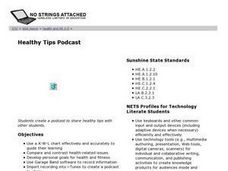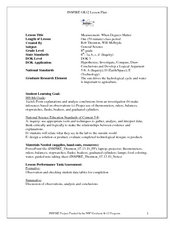Curated OER
Dollars for Darfur
Students send emails to famous people, politicians, and local media services in an effort to inform others of the current situation in Darfur. This includes internet research and a video example of the lesson.
Curated OER
Poetry Movies
Students research, analyze, and describe a poem using the Internet and a variety of technology applications in this Language Arts lesson for the High School classroom. Emphasis is placed on the creation of a Keynote or PowerPoint...
Curated OER
Healthy Tips Podcast
Students create a health-based podcast for peers using prior knowledge, internet research, and KWL charts. This instructional activity is adaptable for different health topics and age levels.
Curated OER
National Parks
Students create national park brochures on selected endangered animals using research information, hand-drawn pictures, and the Pages and KeyNote software programs. This lesson was written for a TAG classroom.
Curated OER
Sea World Fieldtrip Follow-up
Students create a graphic organizer in preparation for a web page about a specific science-related topic. This lesson is used as a follow-up to a field trip experience and can be adapted for many different subjects.
Curated OER
Florida the Best WebQuest
Learners create a multimedia presentation demonstrating that Florida is the Best State in this creative project for the early elementary classroom. The lesson can be adapted for any state or country.
Curated OER
State Research
Students apply previous knowledge of the United States to label a classroom map and then work independently to complete an online scavenger hunt. This lesson is intended for an upper-elementary classroom studying American History and/or...
Curated OER
International Relations: Concept Mapping With Inspiration
Students create concept maps comparing and contrasting Neo-realism vs. Realism and Neo-liberalism vs. Liberalism using the Inspiration educational software. This lesson is intended for a high school level social studies class and...
Curated OER
The Cost of Progress
Students examine the cost of progress from the 1500's to the 1800's around the world and create informative websites based upon their research. This lesson is intended for a high school World History class and uses the Keynote...
Curated OER
Face It!
Learners experiment with proportions and drawing in this excellent Art lesson for grade 5-8. The lesson includes a PowerPoint slide show and requires the use of the educational software entitled "MatchWho". Students are required to use...
Curated OER
Coordinate Plane Transformations
Geometric transformations are explored by high schoolers. They will create a set of instructions for plotting coordinates representing an original transformation of a real-world figure. These instructions are shared with middle...
Curated OER
Wheel of Fortune for Students with Multiple Disabilities
Students play Wheel of Fortune. In this Wheel of Fortune lesson, students with disabilities play an online version of the game to earn rewards and small prizes. Students must solve math problems correctly in order to win.
Curated OER
Wellness Inventory
Eighth graders evaluate their own health status. For this health science lesson, 8th graders complete a worksheet of wellness inventory. They design an improvement plan for themselves.
Curated OER
Measurement: When Degrees Matter
Eighth graders record the temperature change of the beakers. In this general science lesson plan, 8th graders create their own data table for recording observations. They discuss experimental results and cite real life applications.
Curated OER
Rock Identification Lab
Eighth graders compare and contrast the three different types of rock. In this earth science instructional activity, 8th graders classify rock samples according to their correct rock type. They design their own data collection table.
Curated OER
Mineral Lab
Eighth graders examine the physical properties of different minerals. In this earth science lesson, 8th graders explain the uses of minerals in their daily lives. They complete the mineral identification table during the lesson.
Curated OER
Weather Elements and Instruments
Eighth graders identify the different weather elements. In this earth science lesson plan, 8th graders explain the difference between relative humidity and dew point. They discuss the different instruments used to predict weather.
Curated OER
Mississippi’s Contribution to Space Exploration
Eighth graders engage in a class discussion while going through a PowerPoint on Mississippi's contribution to space exploration. In this Space science lesson plan, the students will also participate in Brain Pop quizzes where they will...
Curated OER
Mississippi’s Electricity: From Generation to Consumption
Eighth graders discover how electricity is produced. For this physics lesson, 8th graders infer about the future of Mississippi's energy industry. They participate in a Smart Board interactive activity at the end of the lesson.
Curated OER
Chemical Bonding
Eighth graders identify the three main types of chemical bonds. In this chemistry instructional activity, 8th graders draw Lewis dot diagrams of elements and determine the bond formed. They create a model water molecule.
Curated OER
Photosynthesis and Respiration
Eighth graders differentiate photosynthesis and respiration. In this biology lesson, 8th graders draw a diagram explaining these two processes. They answer a quiz after the lesson.
Curated OER
Introduction to Ecology
Eighth graders identify the living and nonliving components of an ecosystem. In this ecology lesson, 8th graders explain the role each organism plays. They participate in class discussion and answer a quiz at the end of the lesson.
Curated OER
Introduction to Biomes
Eighth graders identify the different kinds of biomes. In this life science instructional activity, 8th graders explain their importance in an ecosystem. They take a BrainPop quiz at the end of the instructional activity..
Curated OER
Classification: Dichotomous Key
Young scholars explain the classification process of organisms. In this biology lesson, students practice writing the names of organisms scientifically. They answer the dichotomous key and discuss answers as a class.























